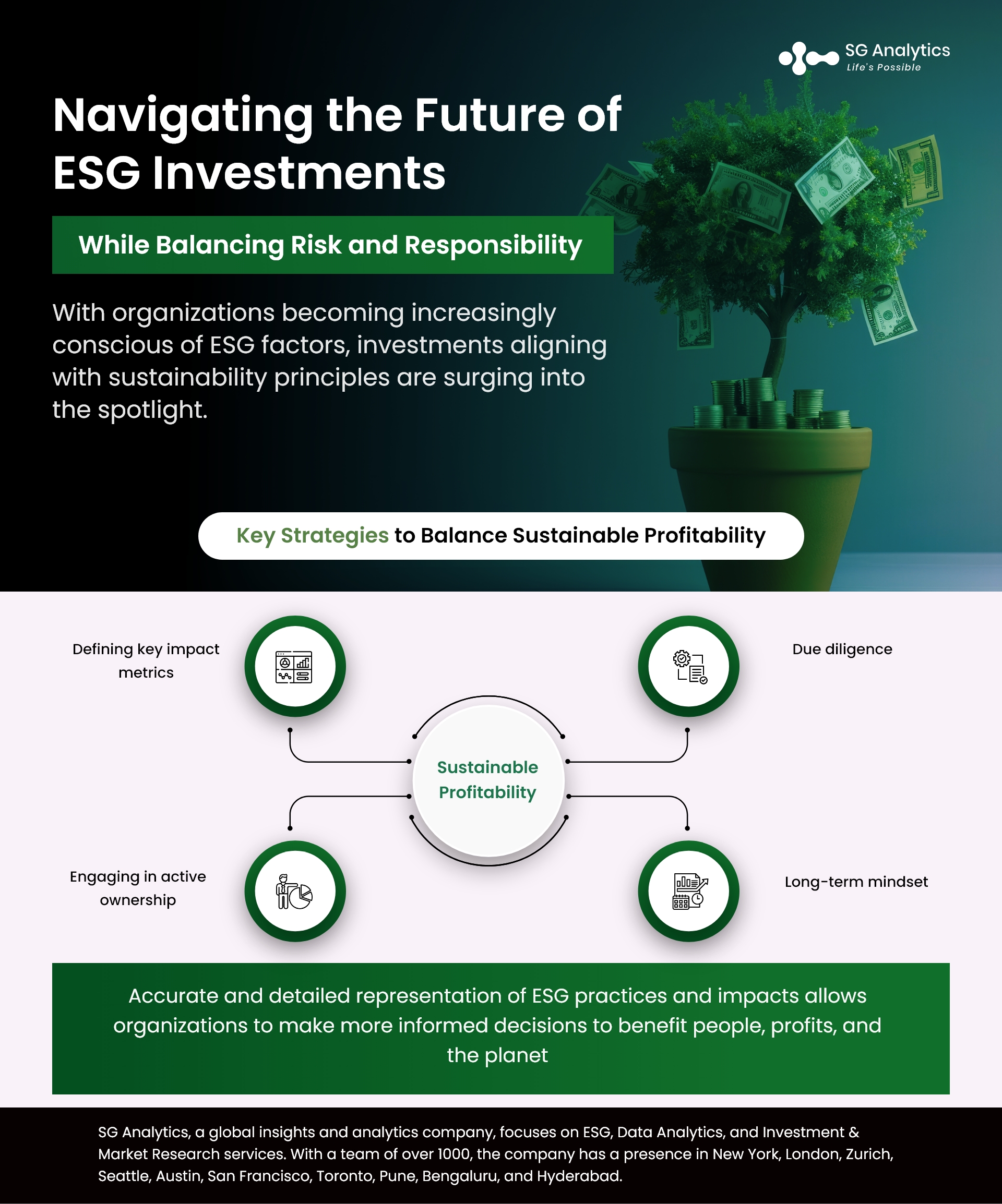Today, ESG has become increasingly critical in modern business practices due to several factors.
First, consumers are conscious of the environmental and social impact of the solutions they purchase.
Second, investors are placing great emphasis on ESG factors when making investment decisions. ESG metrics are being integrated to evaluate the risks and opportunities with investment, offering insights into regulatory lawsuits or reputational damage that companies with poor ESG performance are likely to face.
Third, regulatory bodies are enforcing strict ESG reporting requirements to push organizations to enhance their sustainability practices and comply with regulations. This involves complying with and meeting ESG requirements.
Read more: Making Progress in Sustainability: Setting Realistic Paths for Growth
ESG Investment and Reporting Puzzle
It’s no secret that many organizations are struggling to adopt the Corporate Sustainability Reporting (CSR) directives and other mandates, which are complex, causing uncertainty and requiring major changes across organizational processes.
For organizations, successful ESG reporting includes integrating different strategies on how to do it. The first step involves embedding sustainability in business strategies and highlighting the commitments to achieve Sustainable Development Goals.
Another critical step involves setting targets and working steadily to achieve them and create a lasting impact. Other elements include choosing the right ESG framework and performing a double materiality assessment to understand whether a sustainability target is material to the business from an environmental or financial perspective.

ESG integration in investment decision-making has become a critical aspect of modern finance, influencing the performance and impact of ESG-focused investments. This integration of ESG factors across investment practices plays a vital role in shaping investors' decisions. One of the key aspects of ESG integration is the role of ESG in risk assessment. This surge in sustainable investment signifies a shift in the financial landscape, with asset managers worldwide expanding their ESG investment options.
ESG-focused investments have shown promising performance. Studies are highlighting that organizations with strong ESG performance are recording better financial performance. ESG-focused investments are also associated with lower downside risk. Organizations with strong ESG practices are equipped to manage risks related to environmental, social, and governance issues, making them more resilient.
Read more: How Artificial Intelligence Is Changing the Future of Work
Implementing ESG Investing
Investors are embracing ESG investing for diverse reasons. These priorities help govern the approaches that best align with their goals. Ways fund managers or investment officers can incorporate ESG ratings:
- Active Ownership: They need to try to enhance ESG performance by leveraging their shareholder power and influencing companies’ strategies and operations.
- Negative Screening: They need to explicitly exclude firms with low ESG ratings.
- Positive Screening: They can explicitly include firms that portray high ESG ratings.
- Integration Strategies: They can integrate ESG ratings into their fund management strategy as ESG ratings are becoming a critical factor in driving sustainable practices.
ESG investments represent a paradigm shift in the growing business landscape, signaling a commitment to a more sustainable, ethical, and responsible approach to investing. With the demand for ESG-aligned opportunities continuing to rise, the impact on businesses and the planet is poised to be transformative.
Key Strategies to Balance Sustainable Profitability
- Defining Key Impact Metrics: By clearly articulating the desired social and environmental outcomes and setting measurable impact metrics, businesses can ensure that impact goals can be evaluated with financial performance.
- Due Diligence: Conducting comprehensive due diligence by incorporating ESG factors and assessing potential risks and opportunities related to environmental impact, social practices, and corporate governance will allow investors to align their interests with their values.
- Engaging in Active Ownership: Actively engaging with portfolio companies to promote ESG practices and drive positive change will enable investors to leverage influence. Investors can also encourage enterprises to integrate sustainable practices, diversify their workforce, and enhance transparency.
- Long-Term Mindset: By recognizing that ESG impact investing is a long-term commitment, investors can bring about sustainable change. This will allow portfolio companies to integrate ESG practices and deliver impact.
And with the landscape becoming increasingly conscious of ESG factors, investments aligning with sustainability principles are surging into the spotlight and reshaping the future.
Read more: Ultimate Guide to Power Your Organization's Sustainable Digital Transformation

Putting Together the Data Puzzle
The critical piece of the ESG investment puzzle that all rely on is having the right data. Collecting information from multiple sources, including company internal documents or public databases like smart utility meters in buildings, is a challenge.
Many details need to be tracked to measure ESG targets. This includes documents like invoices, supply chain documents, and other significant bills and reports. It is also important for organizations to collect all relevant data from utility bills to determine their carbon footprint for Scope 1 reporting. But they also need to collect data like vehicle mileage or weight of transported goods from third-party suppliers and partners to report their Scope 3 emissions. This data is harder to collect as it can be hidden in another company’s data lake.
Balancing Risk Management with Responsible ESG Investment
ESG factors are enabling organizations to position themselves as a pivotal part of the modern business landscape and investment strategies. By recognizing the profound implications of ESG on both financial performance as well as long-term value creation, investors are integrating ESG considerations into their decision-making processes.
ESG factors are integral for investment strategies as it is no longer a subject of corporate social responsibility. Investors are realizing how critical ESG is in ensuring that the world and its people have a brighter future. Investors are also prioritizing ESG concerns as they enable them to outperform their competitors and achieve sustainable awareness and action on ESG issues.
ESG risk management helps evaluate and minimize the possible effects of ESG issues on an organization’s productivity and long-term viability. Ensuring that the organization functions sustainably and responsibly helps recognize, assess, and resolve ESG risks and opportunities.
Establishing the right relationship between capital investment and ESG impact investing presents a powerful avenue to drive a positive change and generate significant financial returns. However, finding the balance between cause and profitability requires a strategic approach to incorporate impact metrics, rigorous due diligence, a long-term collaborative mindset, and financial innovation.

By actively navigating these considerations, investors can optimize their impact and outcomes while also contributing to a sustainable and equitable future.
Read more: Climate Actions 2050: Setting a Competitive Path to Achieve Net-Zero Goals
In Conclusion
In a relatively new and fast-growing field crowded with innovative opportunities, challenges, perspectives, and priorities, organizations are integrating robust measures equipped with solid evidence to make informed choices.
Once they have collected the right information, organizations can proceed with completing all the other pieces of the ESG reporting puzzle based on relevant, high-quality data. This also equips them with an accurate and detailed representation of their ESG practices and impacts, allowing the organization and stakeholders to make more informed decisions to benefit people, profits, and the planet.
A leader in ESG Services, SG Analytics offers bespoke sustainability consulting services and research support for informed decision-making. Contact us today if you are in search of an efficient ESG (Environmental, Social, and Governance) integration and management solution provider to boost your sustainable performance.
About SG Analytics
SG Analytics (SGA) is an industry-leading global data solutions firm providing data-centric research and contextual analytics services to its clients, including Fortune 500 companies, across BFSI, Technology, Media & Entertainment, and Healthcare sectors. Established in 2007, SG Analytics is a Great Place to Work® (GPTW) certified company with a team of over 1200 employees and a presence across the U.S.A., the UK, Switzerland, Poland, and India.
Apart from being recognized by reputed firms such as Gartner, Everest Group, and ISG, SGA has been featured in the elite Deloitte Technology Fast 50 India 2023 and APAC 2024 High Growth Companies by the Financial Times & Statista.









